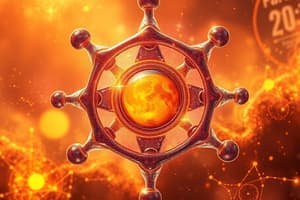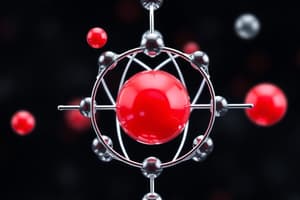Podcast
Questions and Answers
What is the atomic number?
What is the atomic number?
The atomic number is equal to the number of protons in an atom of an element.
What is the atomic mass?
What is the atomic mass?
The atomic mass is equal to the number of protons and neutrons in the nucleus.
What is an isotope?
What is an isotope?
An isotope is an atom of an element with the same number of protons but a different number of neutrons.
What is an ion?
What is an ion?
What is a cation?
What is a cation?
What is an anion?
What is an anion?
What is the average atomic mass?
What is the average atomic mass?
What is an atomic mass unit (amu)?
What is an atomic mass unit (amu)?
What are subatomic particles?
What are subatomic particles?
What are quarks?
What are quarks?
Flashcards are hidden until you start studying
Study Notes
Atomic Structure Key Concepts
-
Atomic Number
- Represents the number of protons in an atom
- Identifies elements on the periodic table
- Equals the number of electrons in a neutral atom
-
Atomic Mass
- Sum of protons and neutrons in the nucleus
- Protons and neutrons each have a mass of 1 atomic mass unit (amu)
Isotopes and Ions
-
Isotope
- Atoms of the same element with the same number of protons but differing neutrons
- Various isotopes have different atomic masses
-
Ion
- An atom that has gained or lost electrons, resulting in a positive or negative charge
-
Cation
- Positively charged ion
- Contains fewer electrons than its neutral form
-
Anion
- Negatively charged ion
- Contains more electrons than its neutral form
Atomic Mass and Measurement
-
Average Atomic Mass
- Weighted average considering all naturally occurring isotopes of an element
-
Atomic Mass Unit (amu)
- Standard unit for measuring atomic mass
- Defined as one twelfth the mass of a carbon-12 atom
- Each proton and neutron has a mass of 1 amu
Subatomic Particles
-
Subatomic Particles
- Includes protons, neutrons, and electrons
- Fundamental building blocks of atomic structure and isotopes
-
Quarks
- Fundamental particles that compose protons and neutrons
- Primarily consists of up and down quarks, which are indivisible elements of matter
Studying That Suits You
Use AI to generate personalized quizzes and flashcards to suit your learning preferences.




